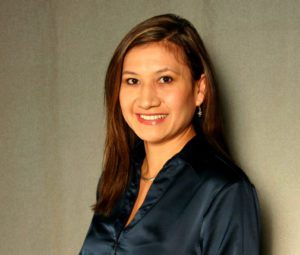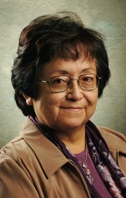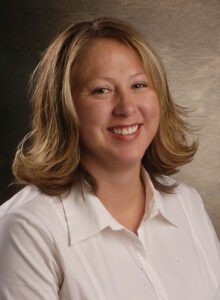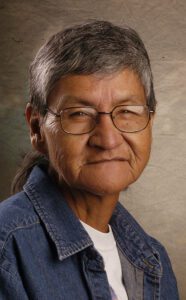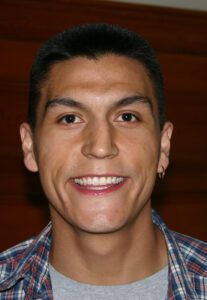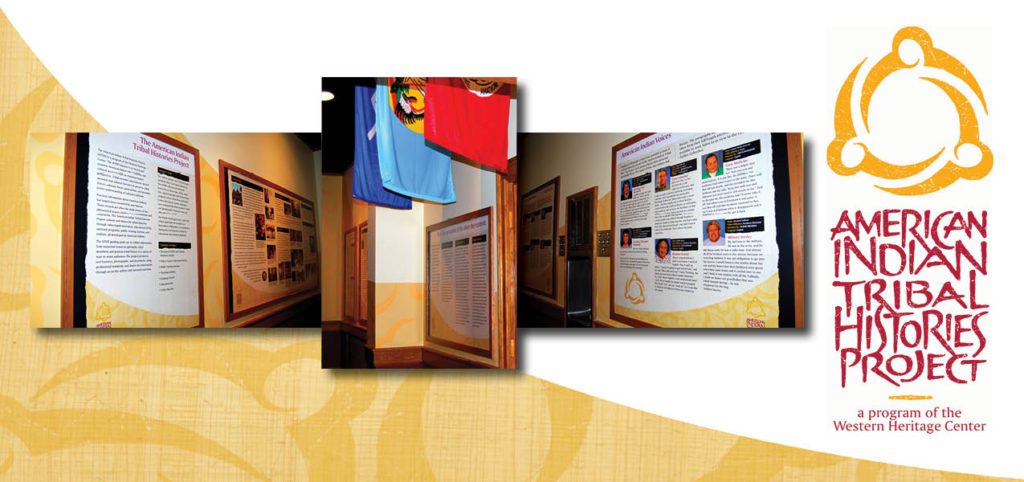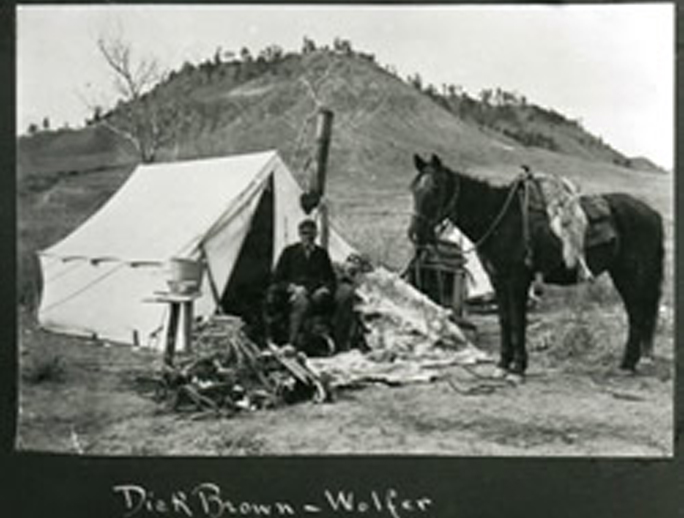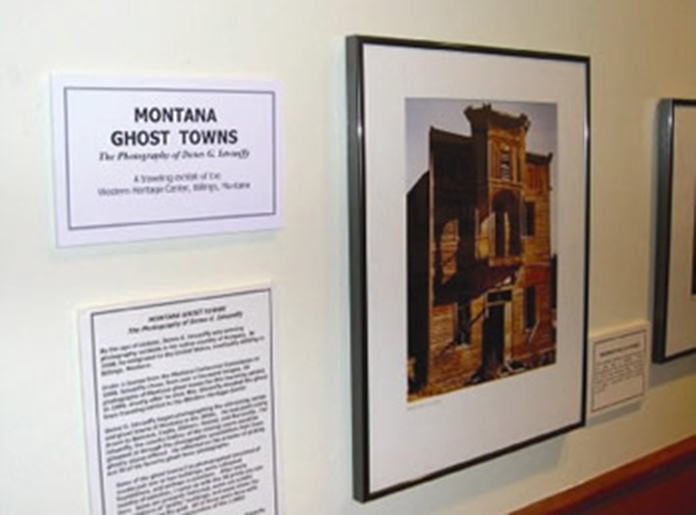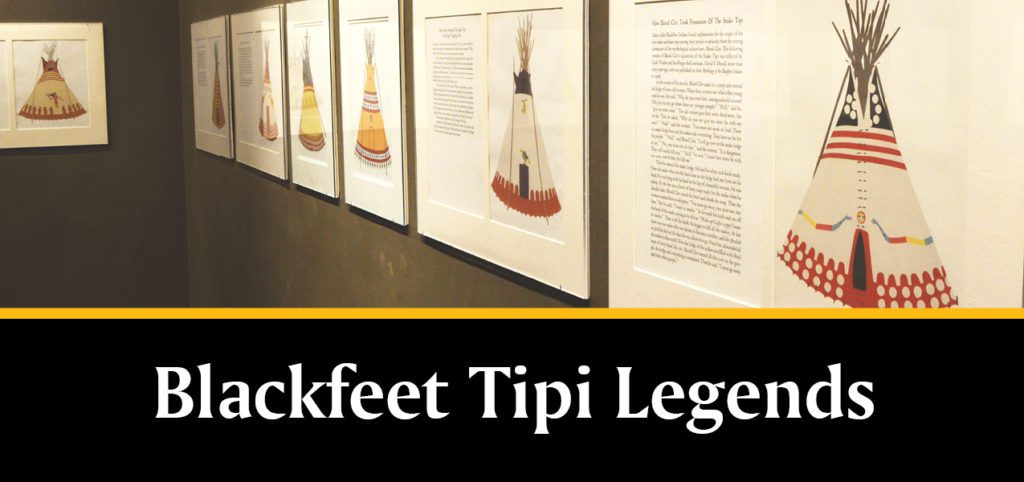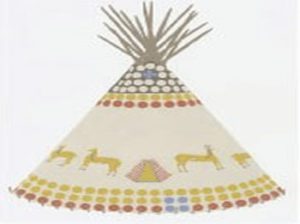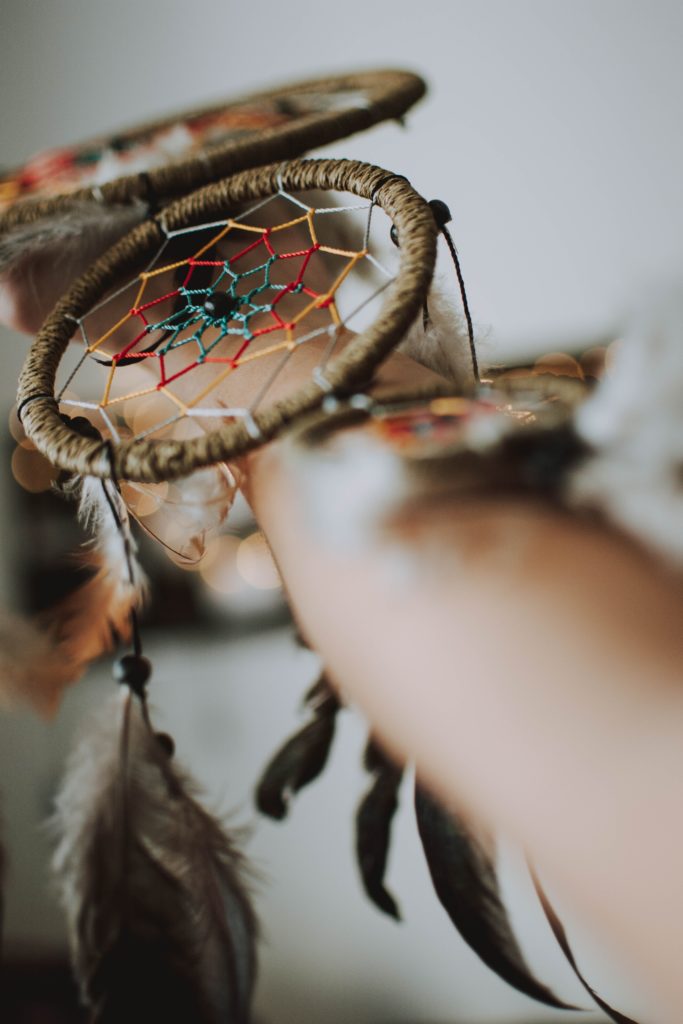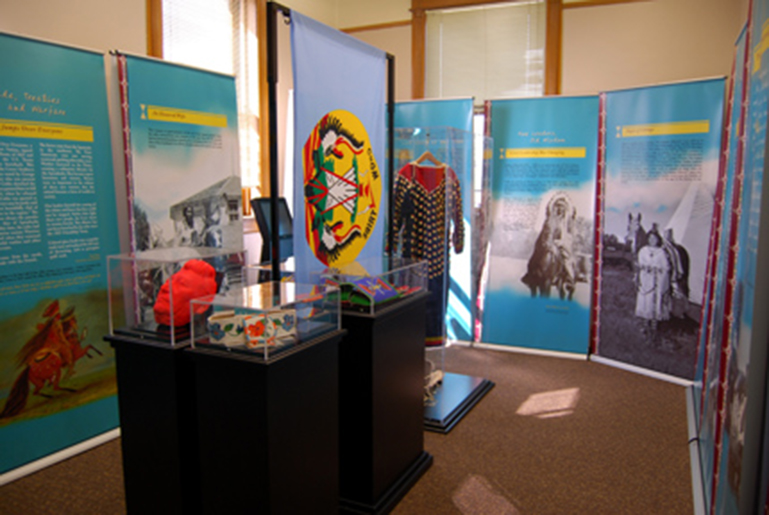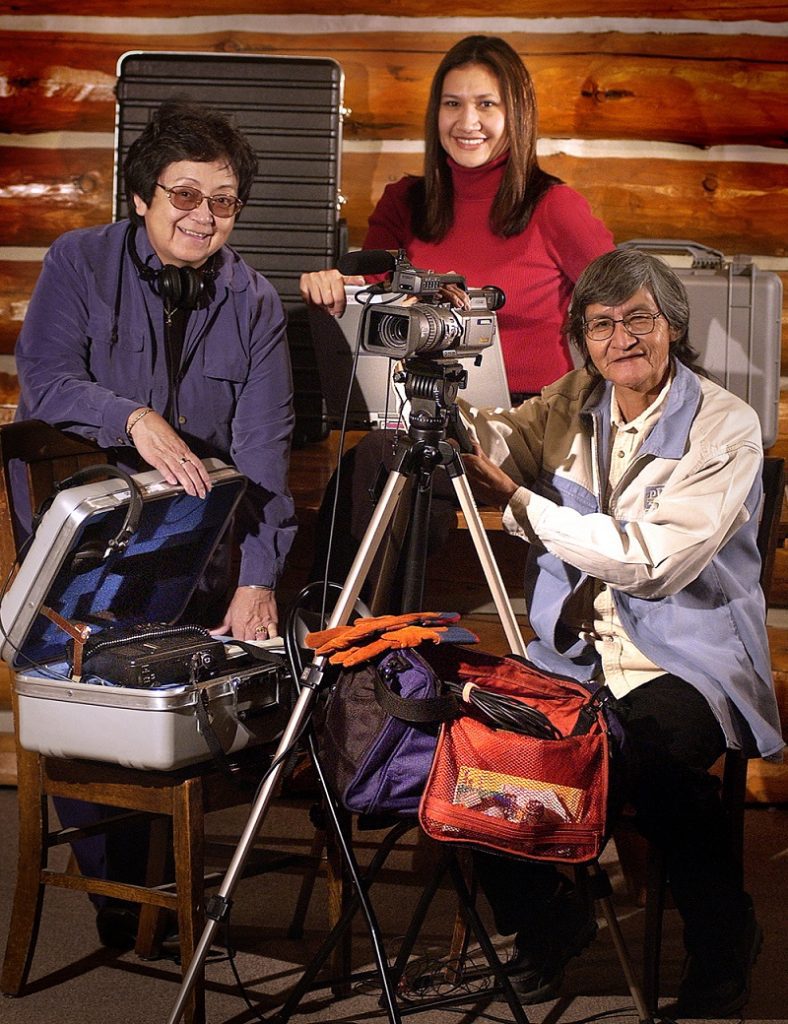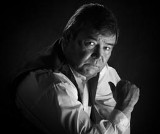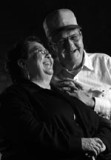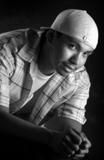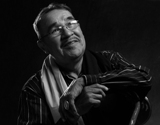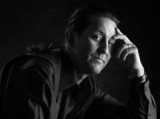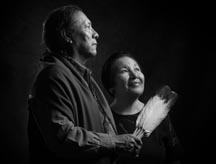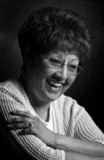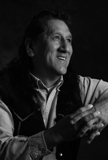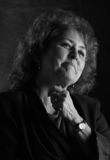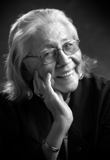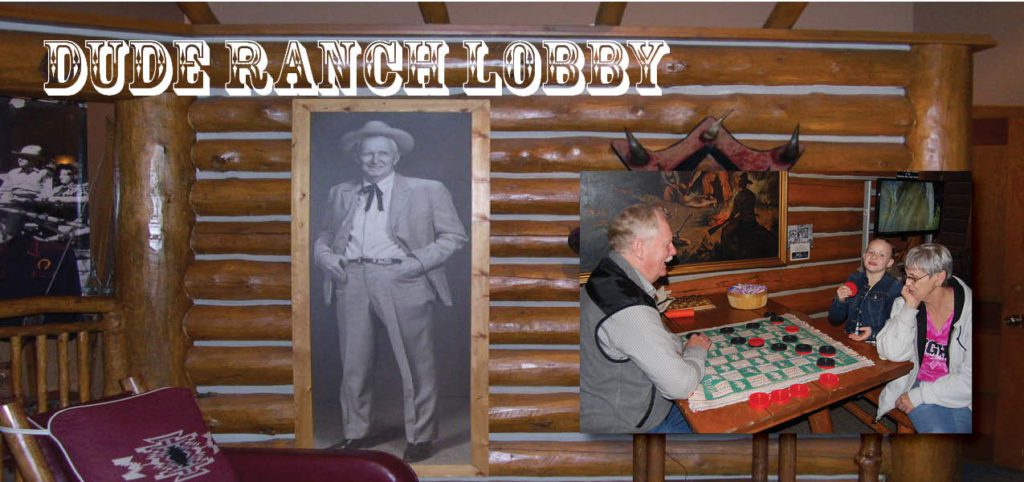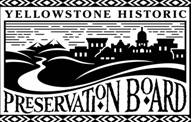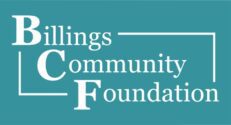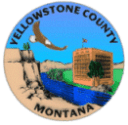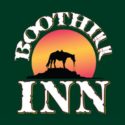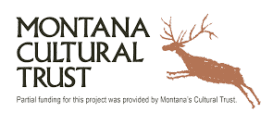The Apsaalooke: Expressions of Crow People
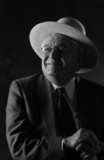
Urban J. Bear Don’t Walk, Crow Tribe
Meaning of Being an Apsaalooke
You have asked me to write a brief essay as to what it means to be a member of the Crow Tribe, and while this is not asking me to bare my soul, it is of course highly personal. Here is a cameo glimpse.
First I am not a “Crow”, but I am an “Apsaalooke”. Crow is a misnomer for our tribe and unfortunately there has been no concerted effort to correct this mistake. I am Apsaalooke, and the literal translation of Apsaalooke is children or descendants of a large beaked bird. The exact identity of this large beaked bird is lost in time gone by. Some Apsaalooke claim that this bird was perhaps the mythical thunderbird.
I am extremely proud of being Apsaalooke, and I try to exhibit this pride in a proper and positive way. Throughout my life, this pride has manifested itself in various forms such as being too defensive, arguing and challenging the non-Indian or pretending not to hear derogatory comments, or not seeing out-right acts of racism or trying to ignore ethnocentric attitudes of the non-Indian. My father was a full-blooded Apsaalooke, and he taught me a lot. The male figure in his life was Bull All The Time, and therefore, he learned considerable about the past history of the Apsaalooke. My children are Apsaalooke and one thing, my wife and I did for our children was to teach them the value of an good education.
As an Apsaalooke, I have an Apsaalooke name and it is “Looks Over His Tobacco Plants.” Tobacco-not the kind sold commercially-has a very prominent place in the history of the Apsaalooke Tribe. This name was given to me by my clan, the Greasy Mouth Clan.
As an Apsaalooke, I feel a deep and abiding attachment to the land that encompasses Apsaalooke Country. Curly, a well known Apsaalooke, argued that the land that the whiteman was referring to as mother nature’s was in reality the flesh, blood and bones of Apsaalooke. Naturally, I am proud of and feel gratitude for those who fought for and gave their lives for the Apsaalooke Tribe and its homeland. Further, I like other Apsaalooke view the earth as one of our three mothers. The other two are our biological mother and our home.
There are many customs and traditions of the Apsaalooke; however, I will mention one, and that is as a young boy, I was taught by my father not to kill animals needlessly. I like my father do not kill dogs. Further, following Apsaalooke thinking, I do not grieve over a pet dog who by some mishap has lost its life. Dogs, according to Apsaalooke thinking have gained a spot in the place beyond; and, furthermore, this dog is taking the place of a close relative or loved one who but for the passing of the dog would have met with tragedy.
If in this brief essay, I have offended anyone particularly my fellow Apsaalooke, I ask for their understanding and forgiveness.
Challenges In My Life
Now that I am older, I am at a certain vantage point to look back over my life, and I appreciate being given this opportunity. In my 60 years plus, there are a few challenges worth mentioning; and these are:
- An educational challenge. I can recall as a young man talking with a BIA educational counselor, and this person telling me that I should seek vocational training and not consider college. I don’t harbor a grudge against this person and probably I should thank this person. As a result of this counseling I became more determined to get a college education. Ultimately, I obtained a Juris Doctorate from the University of Montana School of Law. Be realistic, but don’t discard your dreams based upon a wrong opinion.
- A personality trait challenge. Being raised in an Apsaalooke home, and on the Crow Indian Reservation, I was taught to be deferential to others and not be loud and boisterous. Further, I was taught not to try and outdo others. This environment and a genetic shyness did not serve me in the competitive outside world, and, therefore, I had to learn to over-come this character challenge in order to compete. If your afraid of public speaking, speak publicly at every opportunity. If you are competing, understand the rules, and compete.
- Learning to balance your life challenge. Law can be all consuming, and I am sure this is true of other professions. However, there is more to life than the practice of law. I really didn’t learn this until I hit the wall so to speak experiencing problems with alcohol and depression. I have been dry or sober since December, 1988, but I needed to learn how to live without this “crutch”. I have nothing good to say about the use of alcohol. My folks and others told me, but I wouldn’t listen. Until about 1986, if you told me that you were depressed, I would have scoffed at you and recommended you pull yourself up by your bootstraps. Depression is real, and if you experience depression seek help. Learn how to release your stress in a wholesome way.
As you go through life, don’t misjudge happenings and occurrences and give up because you are challenged. This is part of life, and know that there are others on this planet that are experiencing greater challenges. Usually, what you believe at the time to be a real challenge is nothing more than a speed bump along the road of life.
The future of the Apsaalooke Tribe
You’re asking a mere mortal to speculate (a word detested by attorneys) about the future of the Apsaalooke Tribe, and I have to stipulate to my inadequacy in this area as I do not have a crystal ball to gaze into or am I blessed or imbued with visionary powers such as those possessed by Medicine Crow, Plenty Coups, Wraps Up His Tail, Crazy Head and other Apsaalooke.
Plenty Coups in a vision saw the submergence of the buffalo into the ground or earth and the reemergence of spotted animals different from the buffalo. Medicine Crow in a vision saw a horse with iron hoofs and smoke emerging from its top-probably a locomotive steam engine train. Harbingers of what was to come.
And while this doesn’t necessarily give me license, I have always thought that the persons one chooses to interpret a vision are at least as important as the vision displayed by and through divine revelation.
I admit or confess that I do not know the future of the Apsaalooke Tribe. Many Apsaalooke when asked about the future of the Apsaalooke Tribe would resort to prayer and ask for good things for the future. Prayer, I believe will help, but I also believe in action, and I believe in all my heart that the future of the Apsaalooke Tribe lies in the hands of Apsaalooke people. Therefore, it is us who decide our future – good or bad.
In the past, the Apsaalooke Tribe and even today has been fortunate to have some very wise leaders. Our choice of leaders says more about us than it does about them. We cannot afford to choose what I call “Empty Warbonnets”. We cannot afford to choose leaders for our own selfish ends.
In charting our future for ourselves and future generations of Apsaalooke, we say to our leaders:
- Keep the homeland, the reservation set forth in the treaties made at Fort Laramie in 1851 and 1868, by not selling land. Land is forever – money lasts but a short time. Sits In The Middle of the Land, Big Shade and others entered into these treaties so that the Apsaalooke would always have a home.
- Create a government whereby every Apsaalooke is acknowledged to have value. Make the governmental teepee big. Study how the Apsaalooke government was prior to any influence by the U. S. Government. It did not create a system of “ins and outs” or a system of “haves or have nots”. Accept and use whiteman law only after close scrutiny. It works for them, but it may not work for the Apsaalooke people.
- Hold on to the language, stories, myths, legends, culture, customs and traditions.
- Continue to encourage education not just for the sake of earning a living or making a lot of money, but for the sake of education in and of itself.

Jessica Costa, Crow Tribe
I’m Jessica Costa, Crow name: One who owns fine material things. A member of the Crow Tribe, from Crow Agency, MT. I have been divorced and living a single parent for nineteen years. I have a son named Eric Plain Bull who is married and lives in Norwich, CT. I also have a daughter Named Olivia Plain Bull, she is a student at Little Big Horn College, and resides at Crow Agency, MT as well. I have one grandson and three granddaughters. I’m a descendant of one of the great chiefs of our tribe Chief Pretty Eagle. I have been employed by the Crow Tribe as a Community Health Representatives for over thirty one years. I graduated high school from Riverside Indian School in Oklahoma. I had some nurses training from Haskell Institute in Lawrence, Kansas which is now a junior college.
What does it mean to be a crow trial member?
Being a Crow Tribal Member is special to me. I’m proud to be a member of this Tribe. I have always felt this way. I believe being a Crow is unique in many ways; such as growing up speaking our native language, having a part in our traditional ways, being able to celebrate the different dances and songs that came to us from the creator, also being a member of certain clans and the sacred Crow Tobacco Society.
I guess being raised by my grandmother who took a lot of pride in what ever she did, especially living a traditional way of life and being one of the last women to dress the every day traditional dress (This is wearing plain long dress with four inch leather floral design belt, scarf, and wearing high top moccasins.) has had a strong impact on the way I live my life today.
And foremost being a member of this Tribe gives me the opportunity and privilege to live here in this beautiful land with all its abundance, which we inherited from our elders.
What are some challenges you face being a Crow Tribal member and the reservation as a whole?
I believe living our traditional way of life and taking on the expectations of the nonnative way of living is a challenge to me. Natives living on the reservation are challenged by all the political and racial biases. We are usually stereotyped and clouded with alcoholism, drug addiction, and high percentages of non employment. Yet there are many of us that work hard, diligently, for many years along with striving for improvements and progress. So that the young people today have a better future as well as a better outlook on reservation life.
How have you overcome these challenges?
I begin with myself believing with an open mind good spirit and health. I ask the creator to give me strength to work with, and overcome the existing problem approaching me. I treat all people equal, different races as well, with a positive attitude. I grew up living in an alcoholic and domestic violent home, but through my work I was able to learn to work out these problems for my family and other people in the community.

Anna DeCrane, Crow Tribe
What does it mean to you to be a Crow Indian today?
My name is Biiwihitche, Swims Good, and I belong to the Ties in the Bundle Clan. Being a Crow Indian today means to me that I have a responsibility to pass on what I have been taught about the beliefs, values, and culture of my grandmothers and grandfathers. This means I have to remember, learn, and experience everything about being a Crow. The people I have learned the most from were my mother, sisters, aunts, and grandmother. Sometimes I had to ask a lot of questions. The things I’ve experienced myself are what I understand most. I can only give away what I have in my mind and in my heart.
Being a Crow means spending time with family. We are taught to value people and relationships more than material things. My oldest sister Dorothy makes sure we (my siblings and our children) get together several times a year to share a meal to celebrate an event or for no special reason. Then there is Crow Fair which is like a huge family reunion. Families camp and spend almost a week together.
In the Crow way, first cousins are considered our brothers and sisters. Another way we have extended family is through Crow adoptions. The Crow clan system is an important concept. It provides an extended family, accountability for your behavior, and encourages respect for all people. I belong to the Ties in the Bundle Clan because that is my mothers’ clan and a child of the Sore Lip Clan which is my fathers Clan. Members of the Sore Lip Clan are my clan aunts and uncles. Ties in the Bundle members are my clan sisters and brothers. We also have teasing clans who are allowed to tease you, usually for unacceptable behaviors. My teasing Clans are the children of male members of the Sore Lip Clan.
I composed a list of my siblings and their families with important information that our children should know as Crow Indians. The information includes each person’s clan, the clan they are a child of, and their Indian name written in Crow, with the English interpretation.
Being a Crow means being spiritual. Our clan system, sweat lodges, and sundance are some of the ways we stay spiritual. Crows begin every event or large gathering with a prayer and always before a meal. We depend on our clan aunts and uncles for prayer and call upon them regularly for many reasons. In exchange for their good wishes and prayers, we give them gifts and usually share a meal with them.
My dad taught me how to take care of my mother, brother and sister when they went into the sundance. When I was young, I watched my mom participate in the sundance and it seemed like a hard thing to do. I never planned on being a sundancer but today I look forward to it. My parents, who are deceased now, would have been happy for me. The sundance whistle I use belonged to my grandmother, Georgia, and is very special to me. It is made from a bone with an eagle plume at the end of it. For me, the sundance is a time to pray and reflect. It helps me appreciate Gods creations. The things used during the sundance, like the pine trees that are used for shade, the refreshing smell of cedar, sage, and mint tea become very important. This helps me realize that everything has a purpose. The sun rise ceremony is an awesome experience for me. I especially enjoy listening to the sundance songs the drummers sing.
As a young girl, I enjoyed pow wow dancing and learned some Crow style dances. During Billings Fair in the mid 1960’s, Crows camped east of the fair grounds. I was one of the Crow dancers that performed at the night show. We would get paid right afterwards. Then my sisters and I would head for the carnivals. I met Charley Pride back stage once before he performed as the main event for the night show.
I don’t dance much anymore except for dancing at the Parade Dance on the last day of Crow Fair. This is the day after the dancing contest, parade and rodeo end. We call it Crow Day because most of the non-Crow visitors have gone home. The Parade Dance is a ceremony to pray for all the people that came to Crow Fair and to pray for the following years Crow Fair. Crows don’t take down their teepees or tents until after this day.
My mom belonged to the Tobacco Society and I once attended one of the meetings. Only people who belong to the Tobacco Society were allowed to attend but my grandmother permitted me to stay. My mother said if I stayed, I couldn’t fall asleep. It was held at the old 4-H building in Crow Agency. I sat behind them and watched as my mom and grandma danced in place with their stuffed weasel. The smell of the tobacco used for pipe ceremony has always been comforting to me. Each member is given a song that belongs only to them. My mom knew other peoples songs and would sing them after telling me whose song it was. I always wanted to belong to this society but one has to be adopted into it.
What are some challenges you face being a Crow and how have you overcome these challenges?
The biggest challenge I have as a Crow Indian is passing on the language. Crow was my first language. Every Crow I knew when I was growing up spoke the Crow language. This made it easier to learn. It was important to my parents and grandparents that their children spoke our language. Things are different today and many of our children do not speak Crow. None of my four children are Crow speakers. My oldest son, Alex, spoke Crow before English. When he was about school age he decided not to speak Crow anymore. It didn’t seem matter to me at the time because I remembered how hard school was for me with limited English. Today I am concerned that too many Crow people do not speak the language because everything about our culture is connected to our language. I am learning to write the language so that I will be able to teach my children.
Billings was where I attended my first eight years of school. I was the only Indian in some of my classes. The things I was interested in (like handgames, powwows, and arrow games) were things those kids never heard of nor held their interest.
School was very difficult for me and it always took me a little longer to get work done. One of the reasons working with Native American children has been so rewarding for me is that I understand some of their problems. I can give these children the support I never had. In the mid 1970’s as an aide at St. Charles School in Pryor, I mostly helped with translating the language for Crow speaking children. At that time about 90% of the students were Crow speakers. Today I am a home school coordinator for in the Billings Public Schools Indian Education program. I have had many opportunities to teach and discuss things about our Native American heritage. One of the more enjoyable tasks I have is being advisor for the Skyview High School Native American Cultural Club.
Like a lot of other Native American people, my life has been directly affected by alcoholism. It is a disease that is devastating to the Crow people because it breaks down the foundation of Crow culture which is family, spirituality, values and beliefs. It is extremely heart-breaking whenever a young person’s life is lost due to substance abuse. I believe Crow people can find the answers for many of our problems today by using the concepts and the ways of our ancestors.
When I remember to include my Creator first, I can find solutions for many of my problems. The programs that I’ve been involved with incorporate Native American concepts with contemporary ideas. They are the Medicine Wheel: Twelve Steps for Women, Talking Circle, Pilgrimage, and Urban Indian Parenting. I know first hand that these programs work because while I am a facilitator, I am also learning and applying these new ways to my life.
Where do you see the Crow people going in the future?
Today I see many Crow people making changes that will have a positive effect on our tribe. We have the Seven Hills Treatment Center on the Crow Reservation that incorporates our beliefs and values in a recovery program. The Little Bighorn College, along with an extensive library, is actively finding ways to preserve our beautiful culture. The college offers classes that teach various aspects of the Crow way of life, including the Crow language. The present tribal officials want Crow people to be drug and alcohol free and model that kind of life. It is my hope that our modern day Crow Warriors will make decisions that lead us toward a healthier life style.

Lawrence Flatlip Jr., Crow Tribe
What does it mean to you to be a Crow Indian today?
Being a Crow Indian today means, I have remained on this Earth throughout many generations. I carry the blood of my ancestors, I have learned to survive life. I am here today because of my ancestors; my grandfather-Flat Mouth, my great grandmother-Takes Two Lances; my great, great grandmother-Strikes and Kills; my great, great, great grandmother-Dragon Woman; and my great, great, great, great grandfather chief Long Hair (1730-1835) Chief Long Hair, a Mountain Crow lived among his wealthy family. He was taught in the different disciplines by the important people surrounding him. Each discipline was taught in a unique and worthy way. He was trained so well and was a respected man. Because he was taught so well he was will versed in all things. He had the knowledge and learning to survive life. He was fit and an able man. Chief Long Hair became so spiritually gifted that he could predict the future. It was said he dad made the sun die- he predicted and eclipse. One of his insight was “There’s going to be a great change” – he looked and searched for this many decades. He found this change as he saw the settlers come. His philosophy was “to go with the wind not against it – to go with the change not against it.” The Crows today have original land base because of the knowledge of Chief Long Hair. The stories he shared, the philosophy and wisdom has given many Crow people the strength to survive throughout generations. As a Crow Indian today, I am proud to still be living on the original land base as did my ancestors. I know I have been taught so much and know so many disciplines in being a Crow Indian by my family. I realize the wealth of my knowledge and I fell confident with this knowledge. I was always taught to be Crow and I know I am one. My knowledge exceeds others and I know it. I talk to people of what I know today. Many times society pressures our way of life, our knowledge of being a Crow Indian to become assimilated as knowing the last of family songs, dancer and ceremony. Among the chaos of the new traditions, alien religions and politics, one must make sense of it all.
What are some challenges you face being a Crow and how have you overcome these challenges?
The challenge of not speaking, writing and not reading in the American English language has been a great challenge for me throughout my life. The Crow language is my first language. My thoughts and ideas are usually in a Crow context. When I write or speak American English, I base the depth of the meaning on the significance of what my mind thinks. Challenge of the world, “challenge of the world”, I have not overcome this challenge.
Another challenge I face as a Crow is to live a respectable livelihood and do continue to uphold our ancestor’s way of life. My knowledge in being a Crow is at times threatened by the dysfunction of contemporary society. As I become older, I realize, despite some hardships it is knowing the values of the Crow way of life that helps us to overcome challenges.
Where do you see the Crow people going in the future?
As Crow peoples, I see the next generation, one hand in prosperity and with the other hand in success. I see the next generation more educated and providing professional leadership and good management by taking greater responsibility to help the Crow Nation become more commerce oriented and prosperous. With the new technology of computers, I see opportunity for the Crow people saving and teaching the Crow way of life.
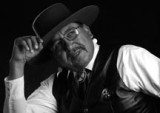
Thomas Larson Medicinehorse Sr., Crow Tribe
I have been asked what it means to me to be a Crow Indian today. I am proud to be a member of the Apsaalooke people. We are a people rich in our heritage, tradition, language and ceremonies. We are able to speak our own language and pass this language to our children, grandchildren and even those who were not born into our culture such as my wife.
The ceremonies we use today come from our ancestors and sometimes other tribes. From the Apsaalooke we use the Ceremonies of the Tobacco Society, Purification, Vision quest and the Driftwood Lodges Clan system to mention a few. From other tribes come the Shoshoni, Bannock and Lakota Sundance’s, and other ceremonies. I am proud to be a member of a group of people who have earned the right to be Sundance leaders and now conduct these dances for those in need.
We also have ceremonies that are done during social events such as the Hot Dance Day Dance, Dog Head eating ceremony, the Tail Feather Getting ceremony and other ceremonies too numerous to mention. The Peyote ceremony has also been brought to our people from other tribes.
I am proud of my heritage and my ability to help those who come to me for help. I am a Sundance Chief of the Lakota Sundance. I use the alter and medicine ways of my great-grandfather Medicinehorse. My relatives gave me the authority to conduct the Sundance and several other ceremonies. Prior to receiving the Lakota way I was a Sundance Chief of the Shoshoni dance. I received this authority from my Grandfather, Joe Hill. I recently passed the right to run the Shoshoni dance to my Nephew, Ben Cloud. As Apsaalooke we need to listen to and heed our dreams and visions. They guide us and help us to make good decisions regarding the happiness of our families and our people.
I have had many challenges getting to this time in my life. I am the Sheriff of Big Horn County and have been since being elected in 1990. My current term ends in December of 2006. This was a hard task to achieve due to the strong dislike of Native American people by non-Indians who also live in Big Horn County. My belief was that no one should be treated different then anyone else. My campaign slogan was, Fair and Equal Treatment under the law for all people. Over the years I have watched things begin to change. From a time when I was young and not allowed to eat my ice cream I had bought in a store in Hardin to today where you hear non-Indian people say, “There’s our Sheriff and he’s an Indian”. People still see and judge other people by the color of their skin but there is a small change, some people are beginning to see people by their accomplishments. It has been hard at times, I have had to become thick skinned and not respond to the remarks made by those who hate Indians.
I see the Apsaalooke people becoming a powerful political force. Our young people are becoming highly educated and are beginning to assume roles in tribal government. Our new leaders will take our people into the electronic age and develop and protect our natural resources thus providing jobs and a better future for the Apsaalooke people. I see these young people still conversing in their native language well into the future and beyond. I am and always will be proud to be an Apsaalooke.
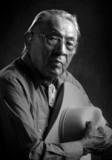
Joe Medicine Crow, Crow Tribe
What does it mean to you to be a Crow Indian today?
Basically I want to be recognized as a good person possessing a pleasant personality and character, being friendly and helpful to everyone to the extent that I will have enlightened, enhanced, and broadened the personal and cultural lives of my Absarokee people. I want my people to retain and preserve the Crow culture while learning and accepting the best of the American mainstream ways. This means attending institutions of higher learning and acquiring a profession skill.
A good Crow Indian is one who has successfully enjoined his indigenous ways with that of the non-Indian, and thus in a position to enjoy a well-balanced and integrated life style. This is living in two worlds simultaneously!
What are some challenges you face being a Crow and how have you overcome these challenges?
I was born in 1913, only thirty years after the Crows were moved to the present portion of the reservation in 1884 and reservation life began.
My grandparents, Yellowtail and Lizzie, who raised me, were pre-reservation people. They often “looked back to the good old days”, not withstanding the harsh assimilation process they must now endure. But these people had strong cultural persistence. The elders continued teaching the children and grand children the traditional Crow beliefs and values. The wise ones would say that there are Four Sacred entities: Earth, Water, Air and Heat. They would explain the ways these four interact to give us good life:
Earth-is your first mother; eventually you will go back to her. Respect her and she will take care of you; abuse her and you will suffer.
Air: is essential, and absolute, it gets into your lungs so you can breathe, talk, sing, etc. Keep it clean and do not pollute it less you get hurt.
Water: comes from the sky as rain, and snow to and into the earth and come out as springs and streams. It is good and useful in many ways. Do not pollute it and get hurt.
Where do you see the Crow people going in the future?
Over and above aforementioned personal and spiritual well-being, economic security is a daily challenge for the Absarokee. Families must have steady employment to have adequate housing, food on the table, clothes on their, transportation cars, and enjoy many other comforts.
In the mid-1800’s Chief Arapoosh said, “the Crow Country is a good country. Everything good is here. There is no country like the Crow Country.”
The large Crow Country has diminished geographically. But the very heart of it is still here in all its richness-the grass, farm lands, timber, game animals, wild fruits in season, and above all, coal, oil, and still hidden minerals. The eastern part of the reservation, say about 50 miles by 20 miles, is under-laid with seams of coal and methane gas.
If and when the elected officials of the tribal council and others, put aside petty politics and become shrewd business men, perhaps our vast natural resources could be developed to make the Crow people the richest tribe in the country.
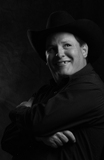
Michael Not Afraid, Crow Tribe
What does it mean to you to be a Crow Indian today?
To be a Crow Indian today means to utilize and take the good things from the Crow Culture and implement those aspects in my everyday life. Being able to distinguish the healthy parts of the Crow Indian Culture and model that behavior for my children. I want to give my children a sense of identity in the Crow Culture and community. I want to instill in them that they know that they belong to a family, a community and a tribe. Wherever they may go and whatever they may do, that they will always have their roots in Crow Country. When I had left Crow Country to either attend school, work or rodeo, I always knew that there was a place and a people that I belonged to.
A good aspect of the culture is the extended family and along with this comes the Crow Clan system. I may not know or understand all aspects of the Crow Culture, but I was taught from an early age about the importance of the Clan system and to always respect and acknowledge my clan fathers and mothers. I have always utilized this way by seeking the advice and knowledge from my clan elders whenever I was to undertake something new or of great importance. I had that security that someone was thinking of me, and I always held, and continue to hold, their prayers and wishes close.
Adoptive parents and adopted children are another important aspect of being a Crow Indian. I always know that I have someone to turn to, such as my adoptive parents,and that I have a responsibility with the adopted children that I was given. I can take the prayers and wishes that were made for me and try and live up to them and then give them back to my children, adopted children and the younger generation of Crows.
What are some challenges you face being a Crow and how have you overcome these challenges?
One challenge is being a cattle rancher on a reservation where the philosophy is to always share and take care of one another. I am not saying that this is a bad philosophy, it is good to a certain extent and this philosophy was a matter of survival before the treaty era. But to be a cattle rancher is to be a business person and this concept is not understood by many tribal members. I think being an individual, who is building a business utilizing tribal resources, is not looked upon kindly by tribal members who do not understand the business and economic development concept. It has been very tough to get established; it has taken years of hard work, discipline and sacrifice to get to where I am at today. One of my biggest sacrifices was to give up my love for rodeo and roping, but I knew that I could not support my family on that type of daily lifestyle.
I have had to overcome a lot of other obstacles such as politics and other prejudices, but I was determined to build a business that was taught to me by my father, grandfather and other family members, and to utilize land that I inherited. The land is a part of our culture and history and I take pride in knowing that I am trying to utilize and take care of what has been passed down to me. I always try to use it in a good way. If I respect it and don’t abuse it, only good things will come from it.
Another challenge is being half Crow Indian and not speaking the Crow language fluently. I feel that this has minimized my absorption of the Crow culture. Not being able to fully understand has affected my participation in cultural events. But again, I have tried to overcome this by trying to participate more with the encouragement of my wife, children and in-laws. My wife was raised in a strong traditional Crow environment and she continues to participate in social and cultural events. She shares her knowledge and experience with myself and she teaches this way to our children.
Where do you see the Crow people going in the future?
I believe more Crow people will become educated and better informed about their issues and natural resources on the Crow Indian Reservation. I see more Crow individuals getting their education and then coming back and establishing their own businesses in our communities. I feel that they will want to re-establish their ties to the Crow Indian Culture and that they will want to develop their natural resources toward a better way of life, but not in a harmful way. They will want to regain ownership and control of their reservation because of their strong beliefs in the Crow culture.
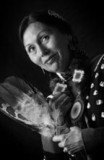
Linda Pease, Crow Tribe
What does it mean to you to be a Crow Indian today?
To be a Crow Indian is more than membership. A true Crow holds to the values and dreams of our forefathers and foremothers. These ancestors prayed for the children to come, their health, survival, spirituality, and happiness.
To be Crow Indian is to be connected to the land. This place, where the sacred tobacco seed grew, must continue. Our ancestors passed the sweat ways down to us, and we will pass it along to our children. The elders brought the Sun Dance back to our people. Just as I participated, so do my children as their children now look on.
A Crow Indian must respectfully acknowledge the cooperation our grandparents had with the early missionaries who brought us education in the inevitable ways of the White Man. A Crow Indian must strive as a warrior strived, to count many coups in education. We too, must take the word of Christ’s never-ending love and peace, and apply it every moment of our lives. A Crow Indian must respect all peoples, regardless of the race or religion.
To be Crow Indian, is to know and live my Mountain Crow identity. Those that came before us reserved the most sacred of mountains for us to enjoy, pray in, and utilize to harvest medicines. There is cool relief from the hot valley summers, plenty of game and water to sustain and nurture us.
The values of my clan shape my daily life. As a woman of the Newly Made Lodge Clan, I maintain and embellish my home and classroom to the best of my ability. These are sacred places, where my children and students dwell. There should be color, encouragement, cleanliness, efficiency, learning and love.
A Crow Indian will celebrate life. I dance with my NightHawk Dance Society to bring the New Year joyfully to my Lodge Grass District. We embrace the new children, bead outfits, and search for hides and feathers. The drums steadily sustain us, the singer give power beyond words. As a new beginning, a Crow Indian will follow the honored warriors, dancing beneath the hot summer sun, through the camps of all. We salute the sacred mountains and visions of our ancestors with every turn of the song. This is the Parade Dance, the Dance of the Four Seasons.
A Crow Indian will honor their Indian name. Daa nii lee iishit cheesh, or Loves to Parade, challenges me proudly proceed before my own and many peoples. I will show mine and my children’s finest beadwork, horses and heritage.
It is hard work to be a Crow Indian, as is anything with many rewards. But, when you hear the camp crier’s songs and messages of honor and the new day to come, a Crow Indian knows they were born in just the right place.
What are some challenges you face being a Crow and how have you overcome these challenges?
It is not easy to be a Crow Indian. It is costly, timely and obligatory. The cultural activities become bigger but are they as strong? That is our challenge: to grow the quantity of cultural events that include our children and make them feel good about their Crow heritage; to build the education systems to include vital tribal knowledge; and to hold on to what essence of Crow culture we have, sharing it with the children openly in the home, communities and schools.
In my home I pass along what my father passed along to me. Now, I hear my son quietly singing praise songs and war dance songs as my nephew joins in. My younger daughter runs far into the hills reveling in the beauty of Crow Country, sweats with her grandmother weekly, and cooks for the feast that follows. My older daughter dresses her son for war dancing at age four, and brings him into the sundance to be prayed for at the center pole, as she prays and fasts for four days.
Where do you see the Crow people going in the future?
Where we go in the future rests in the hands of parents, community tribal leaders, schools and most importantly, the children. As parents, we give our children love that is filled with respect and understanding. As leaders, we build paths that are righteous and forward thinking. As educators, we consider the capacity and learning styles of each child, proceeding with all our energy.
If we do this right, the children will carry all this forward to the next generation and truly into the future.
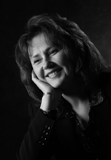
Majel Russell
What does it mean to you to be a Crow Indian today?
For me, being Crow means knowing who I descend from, who my ancestors were, who my relatives are, and the extended family that I belong to. Being Crow means having a Crow name unique only to me and given by an ancestor after much prayer and consideration. Being Crow means having lots of relatives close by that I interact with on a regular basis. Being Crow means having several mothers, fathers, uncles and aunts, sisters, brother and lots of sons and daughters. Being Crow means being responsible for others in your family beyond your immediate household.
Being Crow means knowing that I belong to the Big Lodge clan and who my clan aunts and uncles are. Being Crow means knowing the occasions when to have clan dinners and when to honor clan aunts and uncles. Being Crow means knowing the subtle rules of clan member interaction.
Being Crow today means speaking the Crow language, teaching it to your children, working at speaking in Crow to other Crow speakers. The Crow language is a key component of maintaining our unique culture and heritage. The Crow language contains many expressions and phrases that can not be exactly translated into English. Being Crow is to know and cherish the language and make efforts to preserve it for future generations. Being Crow is being able to be in any setting with Crow people and understand the dialogue.
Being Crow today means being connected to a separate and distinct culture; and for me, being Crow is to embrace, maintain and work to strengthen that connection. Being Crow is to consider Crow Fair as the culmination of a good year and the commencement of a new one. Being Crow is to have a teepee as a necessary possession – to own beadwork for yourself and children. Being Crow is to make every effort not to miss the Parade Dance at the end of each Crow Fair to bring good health and fortune on yourself, your family and the Tribe in the upcoming year. Being Crow is to understand the sacredness of the sundance and to cherish the sound of the sundance whistle. Being Crow is know the object of the arrow games, the rules that govern hand games and the sacredness of the Tobacco society.
Being Crow today means being connected to a specific landbase, the Crow Reservation, to know all the Mountain ranges, the rivers, the communities. As a Crow Indian today, I am a trust landowner and have a duty to preserve the lands that were left to me by grandparents; lands they struggled to keep from easy non-Indian encroachment. As a Crow Indian today, I have a responsibility to be an active and knowledgeable landowner.
Being Crow today means being a member of a distinct political group – a separate nation within the United States. Being Crow today means understanding the concept of sovereignty – that tribal sovereignty is a double edged sword to be respected and feared yet exerted to defend our separateness. Being Crow today means understanding the powers and limits of tribal governments and for me, being Crow is to be committed to the strengthening of the Crow people. Being Crow today is to be proud of the blood that makes me special and yet humble in comparison to all those before me who sacrificed for the survival of the Crow people.
What are some of the challenges you face being a Crow and how have you overcome these challenges?
As a Crow person, my greatest challenge has been to maintain my connection with the Crow people, to maintain my identity as just another Crow member and yet pursue success in my legal career. My challenge has been to keep my balance with having one foot in the middle of all aspects of traditional Crow life and one foot in the professional legal world. My challenge is not to be seen as an outsider by my fellow Crow tribal members.
With my family, I work to overcome this challenge by participating in cultural events, by maintaining a presence among the Crow people, by never letting myself forget who I grew up with and by showing respect for all those older than I.
As a Crow, I am also challenged to remain committed to the betterment of the Tribe as a whole, regardless of how relentless the struggle becomes. I come from a family who has never forgotten who they originate from and who have maintained a commitment of service to the Tribe. My grandparents were Mountain Crows who fought against the Yellowtail dam and fought to change the Crow Constitution, who fought for Indian preference in the school district and who understood the benefit of state and national political involvement for Crow people. The example they set has instilled a commitment to the Tribe in all my family. However, the challenge is to remain focused on the “big picture”, the overall goals and not to be discouraged by minor setbacks and tribal political issues.
Where do you see the Crow people going in the future?
I believe the Crow people as other Native American tribes in this country are at an important crossroad. Either the Crow people will develop an ability to preserve their culture and prosper as a separate and distinct nation in the modern world through effective tribal government or become just another ethnic group in the United States. A strong, effective tribal government is the most effective advocate for preservation of culture and the separateness of Crow people. With strong and effective tribal government, the Crows can prevent further erosion of the Crow reservation landbase, engage in environmentally responsible land and mineral development that will benefit all members, and create an atmosphere that will allow all members to achieve a decent standard of living.
I believe that the Crow people can exercise competent leadership to ensure the existence of the Crow reservation long into the future. I believe the Crow people have the resources to attain self-sufficiency utilizing vast human and natural resources. The Crow were once a Tribe that existed completely independent of federal government assistance. I believe that the Crows can again be independent of the federal government with viable economic development on the Crow Reservation that will create jobs, address poverty.
I believe the Crow culture, traditions and language will survive for many generations and specifically through the lifetimes of my great-grandchildren through the self-preservation efforts of today’s Crow people.
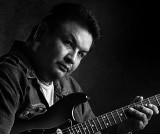
Jared Stewart, Crow Tribe
What does it mean to me, to be a Crow Indian today?
Well, first of all, like I have tried to convey to many young people throughout Indian Country, not just Crow Country, that we as Natives are an endangered, elite group of people. So with that I cherish my heritage, as a member of the Great Apsalooke Nation.
As a Crow, I try to be a great example of my environment; I believe that even if I, myself, may not be as culturally connected to some of the customs such as the Tobacco Society, some of the dancing ceremonies, etc., it is and always will be a responsibility to maintain the opportunities for the other members of my tribe. I have the deepest respect for their knowledge, as well as the rituals practiced by my people. It is not to say that I am completely ignorant in all the ways, I do have things, honors, passed to me by my father and from his father before. These privileges, I will soon pass to my sons, as it always has been, and always, will be. So being a Crow today for me is a great honor.
What are some challenges you face being a Crow and how have you overcome these challenges?
The first challenge was to overcome my fear, fear of failing, fear of persecution, just plain FEAR.
When I get out on my personal journey it was through music. The practicing, traveling, doors being slammed in my face. I am a person that doesn’t quit. “Show me a chance to get my ass kicked, and I’ll show you an adventure!!!”
I had to learn how to work with other people, improve my social skills. Being native in the “White World” with a guitar is tough. I had to learn not to believe my own press, watch out for the pitfalls of Substance Abuse, and learn how to make money, as well as, keep money in the world outside the reservation. Through my commitment, I have received many awards of recognition for my musical ability.
This commitment has led my journey to become an elected official of the Crow Tribal Legislative Branch. The musical journey has slowed, but not stopped. With my experience, I intended to give my tribe the effort that would enable use to become an efficient, cohesive business. Does this seem to be overstating my social, business skills, one might ask? No, I believe there are many others with the same dream.
Where do you see the Crow people going in the future?
As a Crow with a Dream, there is hope. Hope that the Tribal Government improves personnel policies, so that all who work for the tribe, do not fear for their jobs, and give their best.
Also, Hope that as a tribe we continue to utilize Human Resources, so that more opportunities present themselves, and that Natural Resources are less opted for.
I believe a New Day is on the rise that new traditions will be added, to the wealth of traditions of the Crow. These will be in the form of honoring our educated, who through their own dedication should be recognized, by bringing them home, working with us, not against us.
Bringing back our young ones, or older ones will be happening, soon, as well. There are beginning to be more chances to come home and stay home. Soon all will take notice. Long live the Apsalooke Nation!! AHO!!!
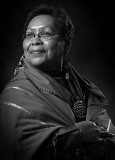
Dorothy Stops at Pretty Places
What does it mean to you to be a Crow Indian today?
I am proud to be a Crow Indian, I am 4/4 degree of Indian blood, born and raised in Wyola, Montana on the Crow Indian reservation. I received my education 1-8th grade at Wyola Elementary School in Wyola, Montana and went to high school 9-12th at Lodge Grass High School in Lodge Grass, Montana. My first language is Crow Indian and I am so fortunate that I know my native language to teach to my children and grand-children. I have attended Little Big Horn College, Eastern Montana College (now MSU-Billings), MSU in Bozeman, Montana. My children think I am crazy when I tell them that I really like going to school, especially college. I never did receive a College degree because of my situations at home, but I took Crow Studies at Little Big Horn College and was a Bilingual Coordinator at the Wyola Elementary School from 1982-1988. I worked at Custer Battlefield National Monument as a Clerk, have worked at Crow Tribal Education Department, and now have worked myself up to Administrative Assistant to the Superintendent/Principal here at the Wyola Elementary School, I really love my job; I get to work with Crow students, and also the parents as I am involved with Parent Advisory Committee, and also a member of the Messenger of Health on the Crow Reservation under the direction of Alma McCormick in Crow Agency, Montana. I also served on the Lodge Grass High School-School Board for three years, because I am so interested in all children’s education and encouraging all to go onto college!!
I am recently divorced and have four lovely children, three boys and one girl, and of course it was my girl who decided to join the U.S. Navy. My oldest son will be going to police academy to become a police officer, and my second oldest son will be receiving his two-year degree in Computer Science in Lawrence, KS-he attends Haskell Indian Nations University, and my youngest son will be graduating from Lodge Grass High School this year. I’ve always worked because even though I was married, I raised my four children by myself, supporting myself and the children with my own income. I am so fortunate that all the jobs I worked at paid for my college courses and workshops so that I was able to upgrade myself to obtain better employment. My own father was in the U.S. Navy and always stressed the importance of getting an education, as a result-all of my brothers and sisters graduated from high school, and onto college. Although I was not really close to my grandparents, when we did visit them, I was taught our Crow language, culture and traditions from them. I was taught to respect my elders and my parents and my brothers, to dress appropriately, to treat your guests in your home, etc. I will always be thankful to them, because of my upbringing I receive compliments on my truthfulness, my kindness to people, and most foremost-my great love of my own children, grandchildren and all children that I come in contact with.
I truly believe that when you know your language, culture and traditions, it gives you self-esteem; it makes you unique, and tends to make you proud of yourself, your parents, grandparents and whoever stood out in your mind of the one who impressed upon you to continue to speak your native language. You feel like you belong to a special group, knowing a language that not everyone can say that they can speak it, and yet you are in a position to be able to teach others.
What are some challenges you face being a Crow and how have you overcome these challenges?
There is the stereotyping of certain races, “all Indians are alcoholics, are dumb, lazy, don’t want to work.” Growing up I have always felt the need to do better, because I was raised where education was always stressed, I felt the need to do well in school. I was Valedictorian of my eighth grade class, I was “B” average in high school, when I attended Little Big Horn College I had 4.0 GP A. I feel that a lot of our native people drink because they don’t know where else to turn to when they are overwhelmed with problems at home, school or on the job. Speaking our native language has at times been considered a barrier, some people would rather that we not speak Crow, because they did not understand what we were talking about.
I feel bad for our elders who speak little English because they cannot express what they need or want. That’s where I stepped in for them when I worked as a Nurse’s Aide in several nursing homes, I was able to translate for them to the other Nurse’s Aides and the R.N & L.P.Ns. They felt very comfortable and protected because I spoke our language and could do things for them, I would write letters or cards for them, I could tell them what the nurses/aides were going to do and why they had to do certain things. I felt good because I knew how to braid their hair the way they were use to and not some other way of fixing their hair. I knew what they wanted to wear so that they were comfortable, looked nice and I didn’t embarrass them by giving them privacy when getting dressed or other everyday necessities that they did. When I worked with the Bilingual Program, I was the coordinator; I set up workshops, trainings, etc. for the Bilingual Aides that were placed in the classrooms. I was able to read & write Crow with them, and then we were able to help the children in the classrooms. They didn’t feel ashamed for speaking the Crow language, but instead were proud of being able to speak it. The same way, when it was time for hand games or a Pow Wow, they were proud to show off their talents by participating and wearing their outfits. We were allowed to attend classes at Little Big Horn College, and it was truly a fine experience to be taught by the best of Indian teachers! I always wanted to better myself so I could help others; I attended a lot of workshops & conferences on the Bilingual Education.
My parents both died at a pretty early age, and here was where the family clan system really helped me and my siblings to know we always had someone to go to for anything we needed. I had to struggle to try to raise my own family, but because I knew my language and my culture I’ve been able to obtain employment. I had to put aside my education for 10 years when I had to care for my mother who was confined to a wheel chair. I never regretted doing that because I didn’t have to tell my mother that I loved her I showed my love for her until the day she passed away, and even after that I still had skills to return to work after all that time!
I’ve had to compete for jobs, and a lot of times I was overlooked when they found out that I was a Native American, but that did not stop me it just made me more determined to be as good or even better than people that were selected for positions that I knew that I was qualified for. I really believe what Chief Plenty Coups said about having a good education makes you a white man’s (or anyone) equal. I am very fortunate that I have learned the importance of educating oneself or obtaining a better education in order to make in this world. No matter where you are whether you are on the reservation or off the reservation you should not let anything prevent you from getting what you want, but you have to prepare yourself at an early age. I am a very firm believer in getting my own children a good education and being able to take care of themselves by going to college and getting a job that will provide for them and a family (when they do have one). I was a good listener, I didn’t talk very much, when I was in grade school, I would rather be reading in the Library then to go out at recess to play. At that time I didn’t really realize how important reading was and still is!
Where do you see the Crow people going in the future?
I feel like the Crow Indians are here to stay and they are continue to do better and rise to the occasion. We have a lot of college graduates, more students living off the reservation and some of them in tribal positions right now. I personally feel that it is now time for us older ones to step back and let the young ones soar, fill the position of tribal officials, business owners, utilizing their own land (instead of leasing them out), and being school officials! There should be nothing to hold them back, true, some of them do not speak our language, but they understand it and they participate in a lot of activities, such as hand game tournaments, dancing, singing, etc. Parents should do all they can to get behind our younger generation and give them the self-esteem and confidence to whatever it is that they excel in!
Language, culture and tradition will be an incentive for our children, grandchildren and their children to carryon our heritage, like we have done with ours. Some of us might not dress tradition, not speak Crow-but inside we are all very, very proud of being a Crow! As long as you have something to believe in, you will have something to keep you going-be it good or bad in the eyes of others. I feel very confident that our children will start to come forward and take control of their lives and make us proud of them, they will continue where we left off. My little granddaughter, this past summer was able to make her own elk tooth dress and was able to dance at one of the Pow wows on the reservation, she was so proud and happy to do that. That was a project that was done at one of the summer schools! I think this is a good thing for all the young ladies to do and then it means more to them, they need to get back to the basics. They need those with the many talents of making their own outfits to show our young ones the make theirs, I felt so bad, when I see some of the little boys or girls on Native American week say that they wish they had an outfit to wear in the parade or on a horse. Our young men could learn from their older siblings, uncles or dads to learn how to drum & sing, that is something that they would be so proud that they could do.
We might not live in teepees or wear buckskin or breech cloths today, but we are Indian through and through. We have instilled in our hearts and minds all the values and customs we need to make in this world, no matter where we may chose to live! Some people may try to make fun of us, but when they get to know us, they know we are very special and they want to be around us. We all make mistakes, but you have to be able to pick yourself up and keep going, no matter what life’s obstacles may throw in front of you. I still remember all the do’s and don’ts that my parents told us and they have helped me to make it. There were times I just wanted to give up because I felt so alone and wasn’t sure I could make it, but once you have responsibilities(such as children/job/other obligations) you cannot give up. I really appreciate my children, it was quite a chore to raise them alone, but today they have made me so proud of them! I really am thankful for my supervisor, Wanda Johnston, who had faith in me and gave me the opportunity to work with her in my present position-who felt I was a role model and asked my helped in dealing with our Native American students.
I feel that our younger generation of Crow Indians are going to do bigger and better things then we ever achieved. I am proud of each and every one of our students, whether or not I am related to them, I feel and take care all our students as if they were one of my own. I make them know that they have someone to come to-no matter what problem they may have and talking to them has a calming effect of them. In our school, I am known not as an Administrative Assistant, but I am Mom, Auntie, & Grandma to all of the children. I love every one of them, when one of them hurt, I hurt, when one is sad, I am sad, when they are happy, I am happy for them. They are already so full of life, so anxious to learn new things, they are probably better at computers than I am, and so full of energy and life!
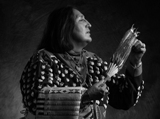
Peggy White, (Well Known Buffalo) Crow Tribe
What does it mean to you to be a Crow Indian today?
Because I was born and raised Crow on the Crow Indian Reservation, I never thought much about the importance of my culture until I began traveling the country to raise funds to start my non-profit organization. Traveling and meeting people beyond I ndian country has given me a perspective on myself and my culture. I also gained another perspective from studying the history of my family. On my maternal side I come from a group forgotten in history books, a long line of traditional chiefs, entrepreneurs and medicine women and men. If there were a chief today, it would probably be one of my family members. On my paternal side I come from a water boy with the 7th Calvalry.
To me, being Crow is being multi-blooded. We carry our history in our veins: other Indian blood from other tribes when we were almost wiped out, white blood from cavalry soldiers and blood from the black, mexican and chinese who built the railroad. As I see it, since almost every Crow is multiracial to some extent, we should be the most open-minded people in the world.
My Indian name is Bale a sa she lesh (translated She Who Wears The Money or She Who Comes From Abundance). The clan system is very important to me because it is the heart of the Crow people. I am from the Bad War Deeds Clan and a child of the Piegan Clan. I believe in all ways of the Crow people: the sweat lodge, the tobacco seeds and fasting as well as the Native American Church, the sun dance and other personal forms of prayer. I also believe that these ways can be interwoven with modern ways to make our children strong.
The Crow people have traditions and beliefs that make us special among all people around the world. For me, being Crow is at the heart of everything I do.
What are some of the challenges you face being a Crow and how have you overcome these challenges?
I have had many challenges in my life including poverty and homelessness and I see many connections in my past to what I do now, I was sent away and raised in government and Catholic boarding schools because one parent died and the other became an alcoholic. The experience shaped me. There, I was forbidden to speak Crow which made me even more committed to my language and culture. I watched children go to bed hungry and shared the food I had with younger ones. I learned how to work around the system. I also learned to work hard and be independent. As an adult, I have started my own organization to empower others. It includes a food bank, a Children’s Learning Center, a community thrift store, a straw bale homeownership project, a youth entrepreneurship program, a social justice group and I take care of many children who aren’t my own. I have also met the challenge of the reservation governmental system and life in a reservation community. We lack resources and knowledge and it seems like there is a conspiracy to keep us in the dark. Our hands are often tied because no one will take responsibility. I have learned to be a problem solver on many levels and to never give up.
Where do you see the Crow people going in the future?
The Crow people are good people. Their government isn’t. It has become corrupt and dysfunctional because it was superimposed on us. We need to reassert our rights as a sovereign state and go back to the time when we were invited in delegations to visit Washington, DC for negotiations. We need to reassert our right to chose our own form of government and go back to traditional values, laws and government where a council of clan elders would have the last word. I believe it is only then that the people with values will rise to the top. We need to break free of everything that holds us back and stop waiting for and depending on the government. We need to stop holding back and challenge the systems in every way.
I see a creativity and energy in our children that aches to be transformed into something productive. I believe traditional knowledge, prayer, entrepreneurship and a broad education that includes global awareness can help our children harness their gifts. We need to teach our children to speak up for themselves and help our children reclaim what is rightfully ours before it is too late. That way we will secure a just future for the Crow people.
 Many individuals from the Crow and Northern Cheyenne tribes generously gave of their time, memories, and knowledge so that priceless stories could be recorded and retained before being lost. We gratefully thank them for their efforts and give these educational resources in their honor. These interviewees shared stories from their personal and cultural histories in order to preserve this important history, educate the public, and to promote understanding. We urge our web users to approach these materials in the same spirit. We provide these resources to students, teachers, researchers, and the general public for educational purposes.
Many individuals from the Crow and Northern Cheyenne tribes generously gave of their time, memories, and knowledge so that priceless stories could be recorded and retained before being lost. We gratefully thank them for their efforts and give these educational resources in their honor. These interviewees shared stories from their personal and cultural histories in order to preserve this important history, educate the public, and to promote understanding. We urge our web users to approach these materials in the same spirit. We provide these resources to students, teachers, researchers, and the general public for educational purposes.